God of War Review
Where Kratos goes, trouble often follows
Although HD remasters are still a quite popular approach when bringing back fan-favorite franchises, complete reboots have also become a known occurrence over the past few years. From Doom and Prey, to Need for Speed and Tomb Raider, there's been no shortage of companies retooling their franchises for a new generation of players. Sony does not wish to be left behind, and as such we can look forward to a new Spider-Man this year, but first up comes God of War. A reinvention of the highly popular over the top action franchise from the PS2 days, the new 2018 version of God of War takes an entirely new approach, one that fits very comfortably in the modern big budget PS4 exclusives catalogue, though it takes a while to get going.
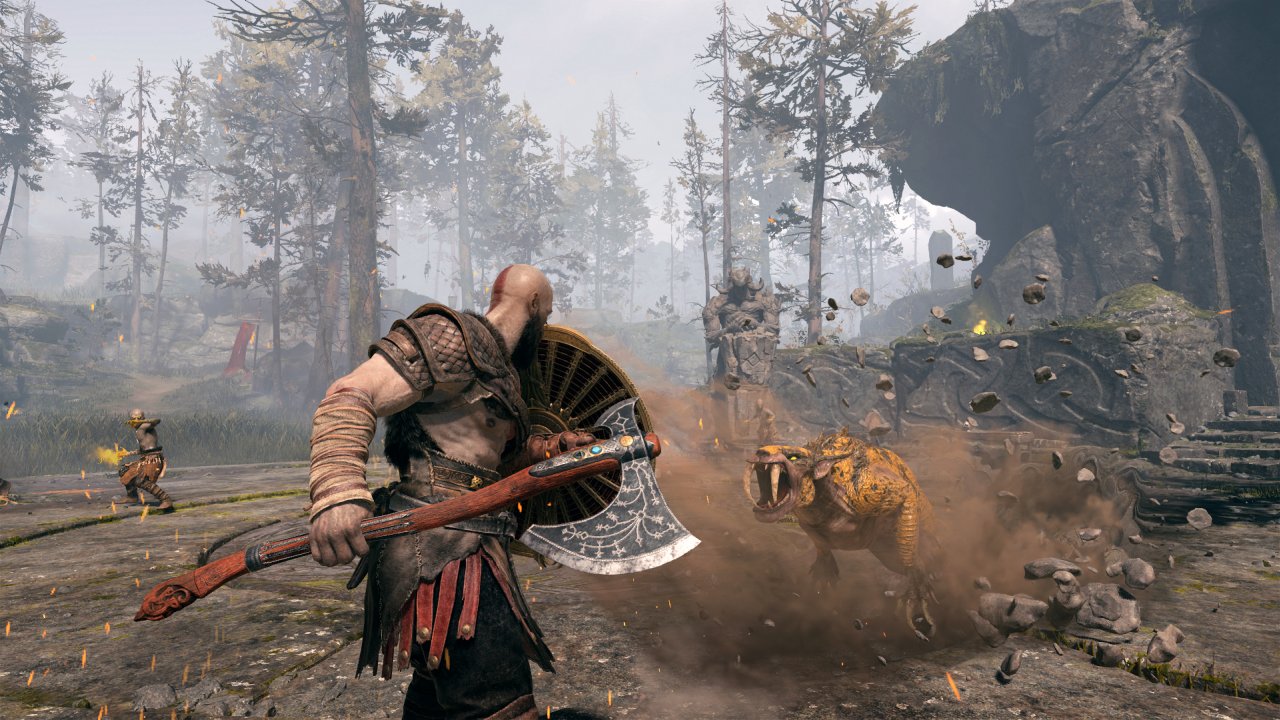
The story picks up years after the last game. Kratos, the God of War and Ghost of Sparta, has left Greece behind, and found a new life in Midgard. He is truly a stranger in a foreign land, so we learn that nobody is aware of his real identity, though that seems difficult to believe given his immense strength and abilities that his son Atreus observes throughout the game. We learn that Kratos had married again, but his wife has recently passed away. It is a very quiet and subdued opening – we follow Kratos and his son as they go on a hunt, right after they both say goodbye to Faye, the Nordic wife of Kratos and the mother to Atreus. The young boy hopes to prove to his father he is ready for the world, while Kratos plays the typical brooding father who demands discipline and hard work. Upon their return, they collect the woman's ashes and set out to fulfill her final wish – to be scattered from the highest peak in all the realms. But, of course, their journey presents many obstacles, and they must travel across a few different realms held together by the world tree Yggdrasil, to reach their ultimate destination.
This reboot is steeped in Norse mythology, and it is as excellently adapted as the Greeks' was in the previous games. Kratos and his son will meet a few different characters along their journey, some friend, some foe, and most being superhuman in one way or another. The interaction between father and son certainly takes center stage, but Kratos also still carries a log of baggage from his past and he is reluctant to share that with this new world. It's not something you haven't seen before, from the strong father figure to the naïve kid trying to prove himself, and it mirrors some of the relationship tropes in Sony's own The Last of Us. It would have also been interesting if the game brought up the heavy subject of Kratos' original family. Still, it is a well executed story and one that ends just as solemnly and reflectively as it began.
Apart from the fairly predictable character behaviors, there are a few other quirks with the narrative. There are infrequent tonal inconsistencies – when Kratos makes serious comments that are funny in context, it works, but when you talk with the shop owner dwarves Brok and Sindri their shallow comedy and cursing don't fit well. It's a shame that you interact with these dwarves the most, given that the rest of the small cast are actually much more nuanced and interesting characters. The voice cast does well in their roles, and the growls of the God of War are menacing as always with Christopher Judge comfortably taking over the reins. The son, Atreus, is a bit bothersome though. The biggest reason for that is he talks a lot – nagging you to move on, pointing out the extremely obvious constantly, and explaining all of the events that just occurred. It's the worst sort of handholding narration, and it's unnecessary in such a linear game. The occasional times you may actually get stuck on a puzzle of some sort, he falls unhelpfully silent.
God of War is a largely linear overall experience, despite the game teasing you of the possibility of picking a path. Just as most modern cinematic action games, you will explore a series of compact linear levels, occasionally finding a side-path for an extra chest. The game does feature the ability to run through previous areas if you so desire, but you'll already re-visit locations a few times as the story unfolds. The game's biggest structural issue are the constant detours – anytime the father and son duo reach a destination, they are forced to go elsewhere, sometimes to fetch a special item, other times just because the goal posts are simply moved by the story. This forced diversion trope gets used a bunch of times over the course of the game and becomes tiresome.
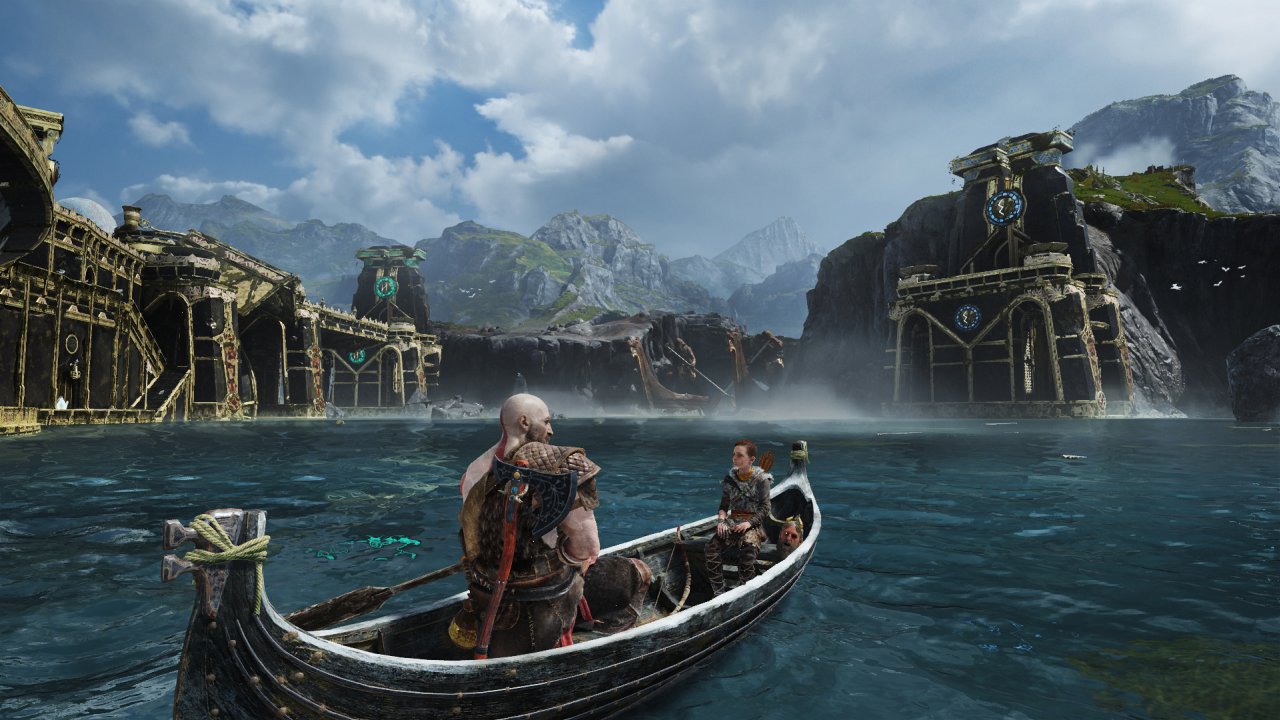
You'll explore a few different Norse realms, though again in linear order initially. The main Midgard realm focuses mainly on the Lake of Nine, which acts as a central hub throughout the adventure. Apart from having to return here to travel to other realms, players can also explore this larger area, which is similar to the Western Ghats chapter in Uncharted Lost Legacy. At the core of level design though is walking and conversing with Atreus, occasional linear climbing, and fight areas. Given that you can't jump, your navigation options are fairly limited. You'll also need to sometimes overcome environmental puzzles, which are usually straightforward but still fun to solve. Your axe becomes important as it can be thrown at specific parts of machinery to freeze it in place, letting you pass, or activating contraptions. You'll also come across chests which you cannot open until later in the story, and some in plain sight but seemingly unreachable, in true God of War fashion.
Fans of the originals will be familiar with the health and Spartan rage meters, and the system of finding three special items from chests to increase them. The design has changed this time around – instead of looking for the location of the chest with the upgrade, they are now prominently placed, but players must use their skills and wits to unlock them. Each such upgrade chest features three symbols, and you must locate and interact with these symbols in the nearby environment. Symbols could be found on three bells you must ring in quick succession, or on three hidden pots that you must destroy. It becomes a sort of minigame, and is a fun challenge to solve.
It wouldn't be a modern action game without RPG elements, so God of War adds those as well. First up are experience points, which are earned after every battle. Due to the game's linear nature, you're pretty much guaranteed to have enough XP to at least unlock a whole bunch of skills to get you through the combat. The skills are split into sections, one for each type of fighting style (with weapon or shield) and one for Atreus' bow. These aren't trees per se, despite a few being connected, as many can be unlocked at any time. The skills are typical, providing you with more attacks and utility skills for crowd control, and helping your son become more useful and dangerous in battle. Skills can be further upgraded at additional XP cost, and some may even gain passive buffs if your stats are high enough in a certain armor category.
There's also a fairly straightforward crafting system that you can spend as much or as little time tweaking as you want. Hacksilver is the currency of the world, dropped by enemies, found by breaking stuff in the environment, and so on. As you explore the world you'll also come across a couple of different material types, and these can be used to craft new pieces of armor for Kratos. New armor becomes available to purchase and craft at the vendor shop as the story progresses, and if you explore even a little you should have no issues keeping up and being outfitted with the best gear available at that moment. You also upgrade your base weapon power, but that requires special material that only comes through the course of the story at specific points. If you're looking for the optional end-game epic tier gear, you'll need to grind and comb all realms for the rare materials needed.
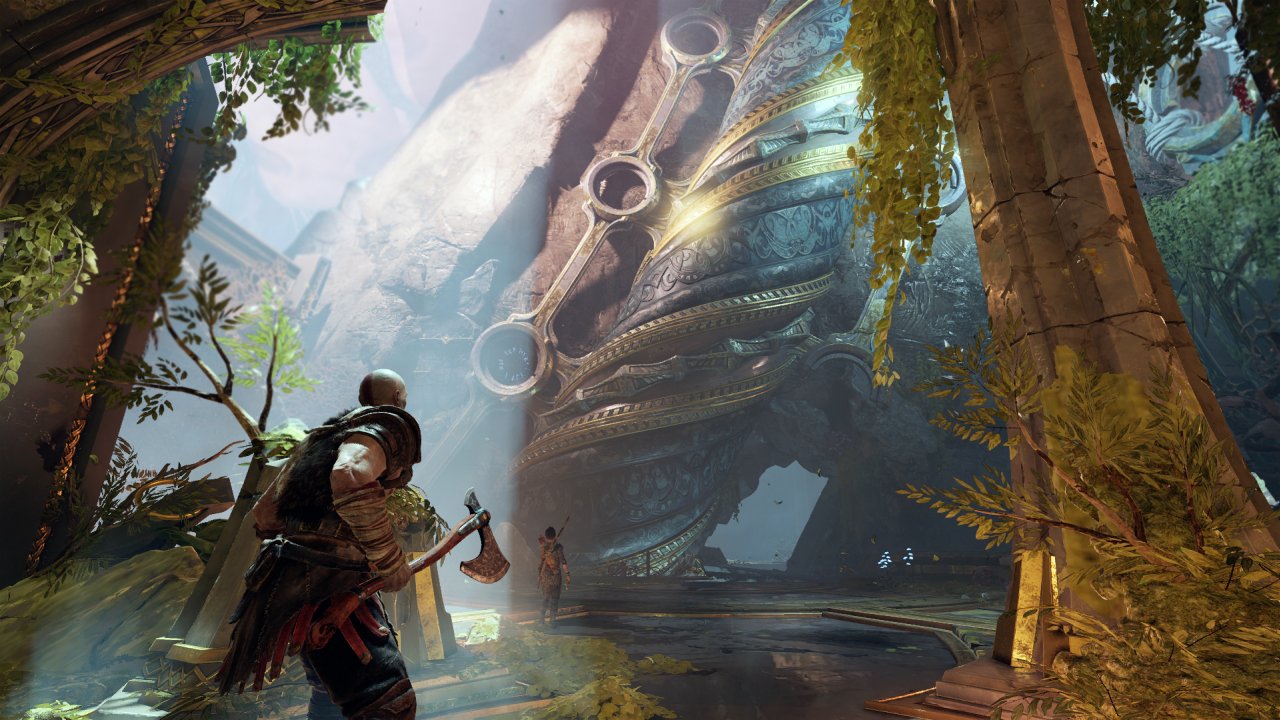
The main goal of armor is to boost your stats, which are strength (damage), runic (magic attacks), defense, vitality, luck (chance to activate perks), and cooldown (of your magic attacks). Armor pieces can boost any one or more of these stats, and can also be upgraded a few times. There is further depth added with runes, which are slottable items that provide further bonuses to your stats, and even carry some passive effects that can be triggered, such as a boost to strength after every defeated enemy, and so on. You will also find/buy runes to use in your three weapon slots, which ties more directly into gameplay, as these are your magical attacks.
This leads us to by far the biggest change in this new reboot, the combat overhaul. Out goes the classic camera that saw the Ghost of Sparta traverse environments from a number of different fixed angles. The 2018 version of God of War is much more akin to other triple-A modern action games, in both the design and moment to moment interactions. You now observe the game world from a more traditional, over the shoulder, third person viewpoint. This works well enough and is easily comparable to other modern games. The combat has been redesigned to be slower paced with a new emphasis on blocking and dodging, though you can still successfully hack away at weaker foes. It feels heavy and deliberate (as there is no jumping), but at the same time if your gear isn't at the right level, enemies can absorb a ton of damage and your attacks don't always feel like they pack a massive punch.
As it's no longer a brawler, the controls have been adjusted, though you can still choose the old-school button layout. The newly introduced Leviathan Axe has the typical heavy/light attack, but, unlike the previous games in the franchise, there's not really a combo system. Some skills allow you to chain them or add-on extra swings, but there's no lengthy combos in the traditional sense, nor is there a hit counter. The axe is an up close and personal weapon, which works well enough with the new camera and smaller battle areas. When enemies come at you, you can hold the shield up to block most attacks, though powerful ones will show a yellow glow and break your stance; red attacks cannot be stopped and must be avoided. Dodging works ok, and if you can get a handle on the sometimes unresponsive lock-on targeting system, the fights do become quite satisfying. For enemies in the distance, or when low on health, you can throw the axe and do solid damage, though it does change the flow and adjusting to the controls on the fly isn't super comfortable. When you don't have the weapon, Kratos switches to his fists and shield, and can continue to deliver some blows to keep the momentum up, then recall the axe when the moment is right. Whether in combat or during exploration, the axe throwing/recall mechanic is cool and never gets old.
Having said all that, things do get awkward sometimes, as you're pinned to a corner or the camera becomes unwieldy, and the axe does not have a very wide attacking range. In these moments, you can use the magic attacks from the runes slotted in your weapon, which are bound to the shield + heavy/light attack. The shield basically becomes an attack modifier that lets you unleash three more moves using the same buttons. It's a neat system because your controls never change, but you can swap out the runes and have different attack types available. All of the magic attacks have a cooldown (instead of the classic mana meter), which can be reduced with the aforementioned armor stat. You've also got the rage meter, which when filled and activated gives Kratos a few moments to deliver some heavy blows and recover a bit of health. Otherwise, you're left running around and manually picking up health crystals as health does not regenerate, as recovery items are not automatically collected like in the past games.
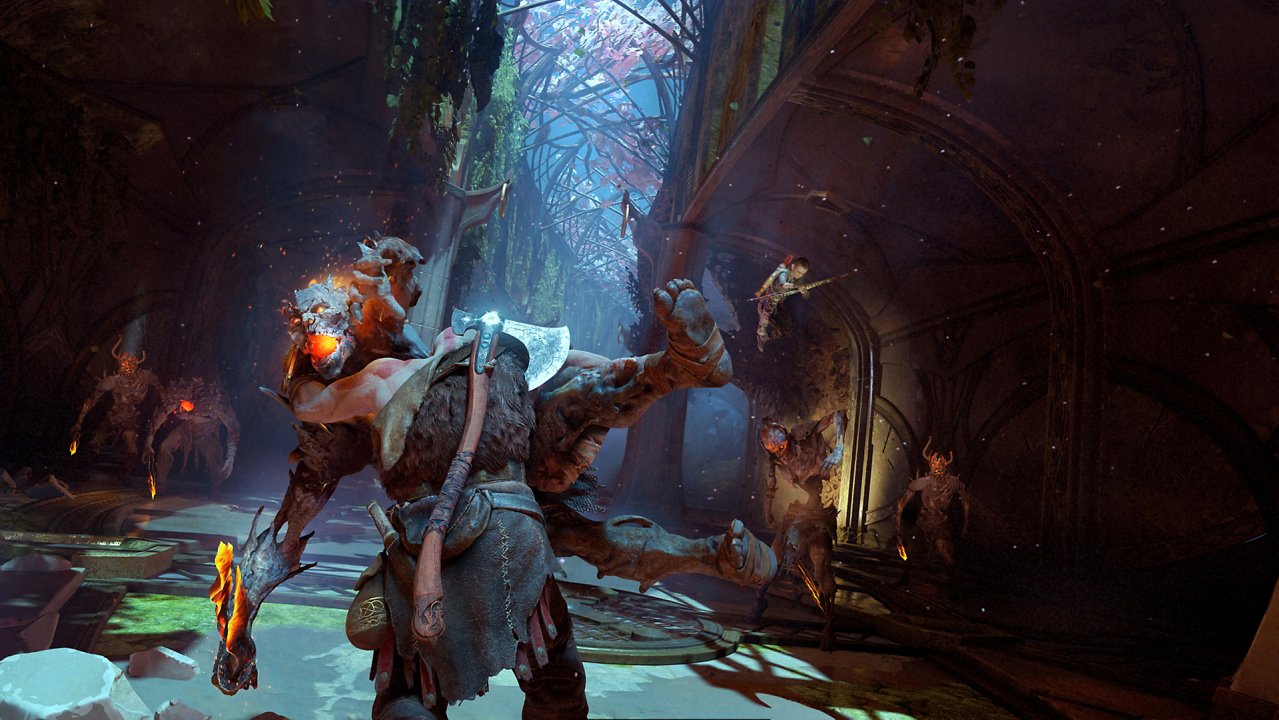
Another big change to the combat is the involvement of Atreus. He is used primarily as a distraction during the initial hours, and can choose to attack an enemy to temporarily stun them. Over time, he gains special arrows that can shock/stun, and has his own skill tree to improve his battle usefulness. You can ask him to fire arrows at a specific target, but there is a limit and cooldown on that ability. Towards the end, he was surprisingly useful in getting enemies tied up. You can also craft some upgrades for him, such as expanded quiver, and new armor with bonus abilities. You don't have to worry about the boy's survival, as he very rarely gets knocked down, and even then you can either wait for him to recover or help him up.
It may be unfair to compare God of War 2018 to its predecessor, God of War 3, which featured incredible scale and bombastic action set pieces, but the enemies you'll face in the new title are a bit underwhelming. You'll be mostly fighting creatures from the Norse mythos, and there are no humans to be found here, though many foes take on nearly identical humanly shapes such as Hel-Walkers and Primordial Draugrs. Flying Nightmares require the axe to be thrown, while Revenants are highly annoying foes that are tough to pin down. Fighting enemies that are largely all the same size and type, though of course with different attacks and vulnerabilities, does get a bit repetitive. The large foes such as trolls and ogres act as mini-bosses, but there are only a few moments of incredible scale in the entire game, and most of the combat, even against main bosses, lacks the sense of chaos and scale that fans would perhaps hope for. At least, bosses feature a few unique mechanics that are a neat gameplay challenge. Kratos also does some satisfying takedowns - whether it's a boss or a regular enemy, filling their stun bar (by doing enough damage, especially with shield or Atreus' arrows) allows you to perform an execution move. There are no QTEs though, which means we only sadly get to observe. There's not as much gore, either, as most enemies are not made of flesh.
It's worth pointing out that God of War feels like a game of two halves. In both story and gameplay, the first half is a slow paced, mostly brooding affair where not much happens and the battles can begin to grow repetitive. But in the second half, when the game begins to return to its franchise roots and introduce both significant story and gameplay changes, with more memorable levels, it really comes alive. It's in these latter hours that the title starts to indulge in the elements that made the original series so fun and successful, and bolstered by new and worthwhile story developments and actual character progression, it becomes much more involving. The combat gets a boost, enemies become more varied, and we finally get to see some revelations and twists.
Having made your way through the story, which is by far the longest for the franchise at about 20-25 hours, there is still more to do in the game world. Even if you've been exploring, chances are you missed some chests along the way, and you can also start to grind towards end-game armor sets. You can complete Favors (quests from a few characters), labors (combat challenges), rifts (tough optional fights), hidden vaults, or just go back in search of collectibles. Performing these tasks will likely net you some rare materials, as well as XP to finish unlocking all skills. The very high-end armor is needed if you want to tackle the optional realm where a series of increasingly challenging battle arenas await. God of War is definitely anything but short on content.
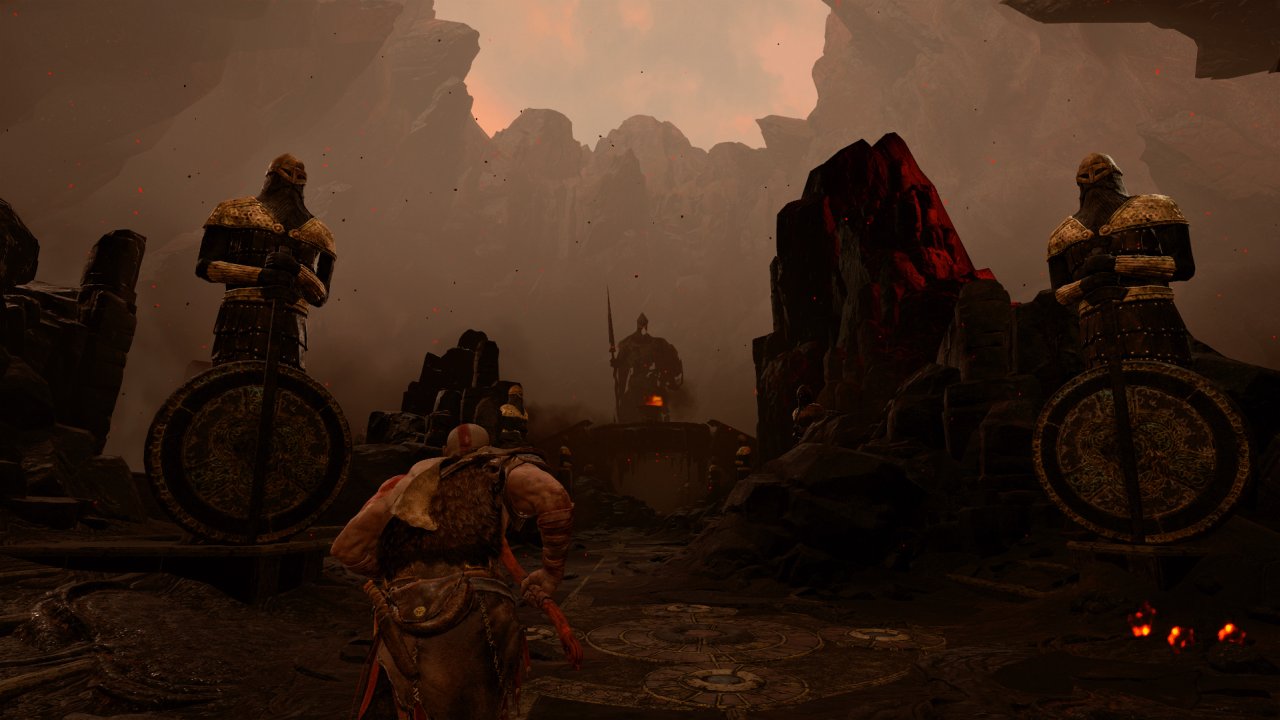
As can be expected from a big budget first party title, God of War is a great looking game. It has a high level of detail, the facial animations are quite life-like, and the sheer technical fidelity is of a high standard. It is about on par with Uncharted 4, though the level of detail and destruction is a bit lower, as is the scope of the levels. The game should also be commended for not using any camera cuts – the entire experience is an uninterrupted view from Kratos' perspective. It’s a unique and impressive feat, though at the expense of a few awkward angles. The art design is mostly subdued and relies on caves/ruins/mountain passages, though there are a few locations that look quite amazing with an assortment of bright colors assaulting the senses. You can tweak the HUD to make the game even more immersive. On the base PS4, the game runs without any issues, though there were a few instances of distant backgrounds looking a bit blurry, and the framerate dipping in certain scenes. The soundtrack is bombastic and layered with dramatic overtones, though it often gets lost behind the rumble of combat.
There's no mistaking the 2018 version of God of War as anything but a modern release on the PlayStation 4 that follows other big budget blueprints. It features all the hallmarks of game design that first-party Sony studios have found success with, from a cinematic and dramatic storyline to the third person combat and basic RPG elements. Little of it is groundbreaking, but the experience comes together well enough, especially given the much improved second half, and bolstered by strong presentation. It's a new era of war, both physical and mental, in a well-realized world. The reboot may lack the adrenaline pumping action of its predecessors, but it succeeds on delivering the highly polished modern experience that fans have come to expect from a console exclusive.
A digital code was provided by the publisher for the purposes of this review.
 Comments
Comments


















